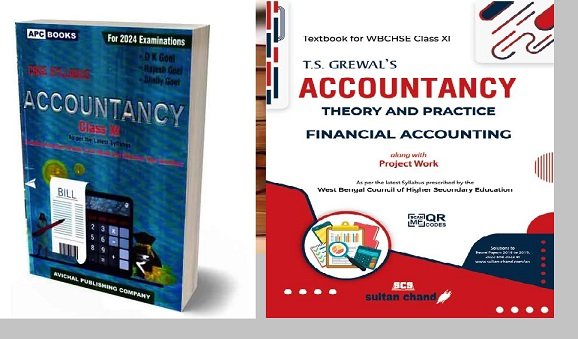Table of Contents
ToggleIntroduction
Accountancy is a vital subject for Class 11 students pursuing commerce. It lays the foundation for financial and managerial accounting, making it crucial for aspiring accountants and business professionals. Selecting the right Accountancy Class 11 book ensures a better understanding of concepts and higher academic performance.
This guide covers the syllabus, recommended books, topics, features, and tips to help students excel in their studies.
Why Accountancy Is Important for Class 11
Accountancy teaches students how to record, classify, and summarize financial transactions. It helps them:
- Develop analytical thinking.
- Understand the financial workings of businesses.
- Build a base for professional courses like CA, CMA, and MBA.
CBSE Accountancy Class 11 Syllabus
The CBSE syllabus is divided into two parts: Part A: Financial Accounting – I and Part B: Financial Accounting – II. Here’s a detailed breakdown:
Part A: Financial Accounting – I
- Theoretical Framework
- Introduction to accounting.
- Objectives, concepts, and principles.
- Basis of accounting: Cash and accrual.
- Accounting standards and IFRS.
- Accounting Process
- Recording of transactions.
- Ledger, trial balance, and subsidiary books.
- Bank reconciliation statement.
- Depreciation accounting.
Part B: Financial Accounting – II
- Financial Statements
- Preparation of trading and profit & loss accounts.
- Balance sheet with adjustments.
- Accounts from Incomplete Records
- Single entry system.
- Computers in Accounting
- Need and benefits.
- Accounting software basics.
Table: CBSE Accountancy Class 11 Topics Overview
| Unit | Topics Covered | Weightage |
|---|---|---|
| Theoretical Framework | Objectives, principles, standards, IFRS | 10 Marks |
| Accounting Process | Recording, ledger, trial balance, bank reconciliation | 20 Marks |
| Financial Statements | Profit & loss, balance sheet | 20 Marks |
| Accounts from Incomplete Records | Single-entry system | 10 Marks |
| Computers in Accounting | Basics, advantages, limitations | 10 Marks |
Recommended Accountancy Books for Class 11
Finding the right book can simplify your learning experience. Here are the top recommendations:
1. T.S. Grewal’s Double Entry Book Keeping
- Covers both Part A and B of the CBSE syllabus.
- Includes solved and unsolved questions for practice.
2. DK Goel’s Accountancy
- Well-structured explanations.
- Focuses on practical problems and theory.
3. NCERT Accountancy Class 11
- Official textbook for CBSE students.
- Simple language with clear illustrations.
Features of a Good Accountancy Book
- Comprehensive Coverage: Should cover the entire syllabus.
- Practice Questions: Include ample solved and unsolved examples.
- Clarity: Simple and easy-to-understand language.
- Updated Content: Aligned with the latest CBSE guidelines.
How to Study Accountancy Effectively
1. Understand the Basics
- Learn the principles and concepts before diving into complex problems.
2. Practice Regularly
- Solve different types of questions daily.
3. Use Visual Aids
- Use charts and tables to simplify data interpretation.
4. Revise Frequently
- Make concise notes for quick revisions.
Importance of Solved and Unsolved Questions
Solved questions help you understand the method, while unsolved ones improve problem-solving skills. Opt for books that offer both to master accountancy concepts.
Top Resources for Accountancy Class 11
- Online Platforms: Websites like BYJU’s and Toppr provide video tutorials.
- Mock Tests: Solve sample papers and mock tests for better preparation.
- Study Apps: Apps like Meritnation offer chapter-wise solutions.
Sample Problems and Solutions
Problem 1
Prepare a journal entry for the following transaction:
Goods worth ₹10,000 sold to Mr. X on credit.
Solution
| Date | Particulars | Debit (₹) | Credit (₹) |
|---|---|---|---|
| YYYY-MM-DD | Accounts Receivable (Mr. X) | 10,000 | |
| Sales Account | 10,000 |
Problem 2
Prepare a Trial Balance with the following balances:
- Cash: ₹50,000
- Bank: ₹30,000
- Debtors: ₹20,000
Solution
| Account | Debit (₹) | Credit (₹) |
|---|---|---|
| Cash | 50,000 | |
| Bank | 30,000 | |
| Debtors | 20,000 | |
| Total | 1,00,000 |
FAQs on Accountancy Class 11 Book
1. Is NCERT sufficient for Accountancy Class 11?
Yes, NCERT covers the syllabus comprehensively. However, reference books provide additional practice.
2. Which is better, T.S. Grewal or DK Goel?
Both are excellent. T.S. Grewal is preferred for theory, while DK Goel excels in practical problems.
3. How can I score full marks in Accountancy?
Focus on understanding concepts, practicing regularly, and revising thoroughly.
Conclusion
A good Accountancy Class 11 book is the first step toward excelling in the subject. Choose wisely, study diligently, and practice consistently to build a strong foundation for future academic and professional success.
